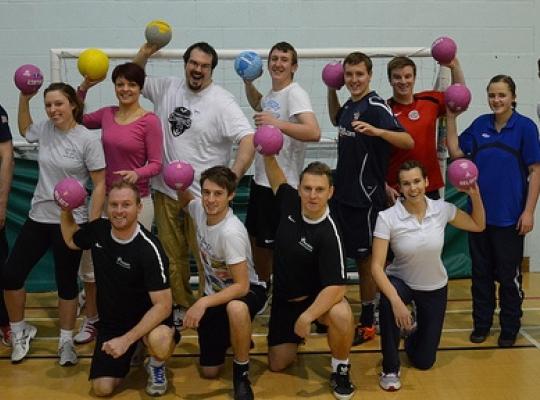Permission to Lunch: Manifesto for health calls for a revolution of the workplace lunch break
The UK’s culture of not taking a lunch break is damaging the nation’s health, according to a manifesto published today by frontline physical activity activators CSP Network, developed in conjunction with latest research from the British Heart Foundation National Centre for Physical Activity and Health (BHFNC).
The ‘manifesto for a flexible lunch break’, draws on two years of research findings, collated from survey data and interviews of participants engaged in ‘Workplace Challenge’ – a free online tool used by over 45,000 workers to log their physical activity, using the peer support of work colleagues to engage in active lifestyles. The research highlighted a key barrier to an active lifestyle was lack of flexible working practices, with the current culture of working through the lunch break seen as a deterrent for people to get active, during the lightest and brightest part of the day.
The lunch break is championed as a time for employees to recharge the batteries. However, in recent recession hit years, there has been greater pressure placed on employees to take shorter lunch breaks, or no break at all, leading to some feeling chained to their desks and worse, feeling frowned upon or overlooked for promotion if they choose to get their trainers on or go for a walk at lunchtime.
Others have struggled to fit exercise alongside valuable ‘catch up’ time with colleagues into their prescribed hour long break. This has placed the UK’s workforce at a distinct disadvantage when compared to their European counterparts, who have historically been able to mobilise longer ‘siesta time’ to exercise. Contra to what some employers may have intended, when it comes to the focus for productivity, the research suggests that those who are ignoring the health of their employees are likely to be directly damaging the bottom line of their business.
The BHFNC, who monitored people engaged on the Workplace Challenge programme at three monthly intervals, found that those who adopted a more active lifestyle were seen not only to reduce the number of days they took as sick leave by 0.6 at the 6 month marker but also have reduced their number of days of ‘presenteeism’ – i.e. those present at work when sick by between 1.4 - 1.7 days. As a result, employees brought less infection to work (reducing the risk of passing on illness to others), ensuring an increase in productivity for themselves and across the whole business, resulting in a more motivated and engaged workforce.
Left unchecked, with a culture of sedentary commuting and workplace inactivity, it has been shown that the average number of sick days taken has risen to 5.31 per person per year, costing business a total of £14.9 billion in lost working days[1]. Public Health England now estimate that more than four out of 10 adults do not do enough physical activity to achieve good health and with 60% of people’s waking hours spent at work, employees are being left with few options for improving their health outside of the working day.
Plus the negative effects of lack of access to daylight on mental health (linked to depression and Seasonal Affective Disorder SAD), means that the lunch break is now the obvious choice for getting active, outdoors and accessing the brightest part of the day.
The manifesto for a flexible lunch break encourages employers to consider requests for people to start work a little earlier or leave a little later, with a longer lunch break during the day, with those tasked with creating shift rotas encouraged to factor in access to daylight and active social times. The manifesto also calls for more proactive promotion of workplace activity, such as employee noticeboards, fitness classes and midday mile activity such as social walks, runs and cycles to bring colleague interaction and health closer together along with stronger collaboration between local businesses and local sports coaches, clubs and facilities for after work to follow on.
Lee Mason, Chief Executive of the CSP Network said,
“We now have compelling evidence to suggest that a shake up of the workplace culture is needed to drive the health of the nation. With 73.6% of 16-64 year olds in work, and such a large proportion of people working throughout daylight hours, decisive action must now be taken to embed a culture of activity across workplaces.
The good news is that it is a win-win for employers with a positive impact on the bottom line, with a more active workforce being more productive both in terms of absenteeism and presenteeism. Nationally, if we could just cut one sickness day per person per year, we would save businesses across England an estimated £2.8 billion per year.
The Government’s strategy document, Sporting Future, makes it clear that employers have a responsibility to promote opportunities for employees to be physically active but we also want to take this one step further to reinforce the benefits that an active culture has on the bottom line and culture of a business, as well as the wider benefits of increased morale and community cohesion. With this in mind we are writing to all MPs to request that they work with us to promote the benefits of adopting a flexible lunch break culture and help us to take proactive steps to encourage workforces to get active during the lightest and brightest part of their working day.”
The manifesto gives employers practical guidance on how to adopt a more active culture and contains a sickness savings calculator to help demonstrate the benefits to business of employees being more active during a working day.
The CSP Network, in addition to their free logging tool provided through the ‘Workplace Challenge’ programme is also offering free workplace consultations and advice for workplaces across their 45 local frontline CSP teams, with an array of workplace events planned during 2016.
A free copy of the manifesto can be downloaded for the workplace challenge site
ENDS
[1] Calculated using data reported in a Nomis Labour Market Profile for England measuring economic inactivity between July 2014 and June 2015. This figure is based on the calculation of time lost at work, not the cost of productivity from staff while at work.
NOTES TO EDITOR:
Please direct all media enquiries to media@workplacechallenge.org.uk
For enquiries regarding the Workplace Challenge please contact Andrew Watson, CSP Network (Project Manager) on awatson@cspnetwork.org / 07739 657732.
Workplace Challenge
· Workplace Challenge’s activity tracking platform is a free online facility available through www.workplacechallenge.org.uk that enables individuals and workplaces to log all of their physical activity, and easily compare activity levels to other participating individuals and organisations.
· Active loggers will be able to see a variety of stats including distance travelled, calories burned, CO2 saved and progress against the recommended 150 minutes of physical activity per week using a targets bar. It's also possible to set personal targets in 2016 (linked to fundraising if you wish) and create your ‘circles’ to compare your progress against friends and colleagues. All these features and more are available from your dashboard.
· A minimum of three registered employees are required for a workplace to appear in a leader board and people can also track their own individual progress locally and nationally.
· 37 local County Sports Partnerships manage the online platform for their community, ensuring that there are challenges, activities and competitions available offline to encourage people to stay active.
· Workplace Challenge is supported by Sport England through the Get Healthy Get Active fund.
County Sports Partnership Network
· The CSP Network represents 45 local County Sports Partnership teams across the country.
· Collectively, they contribute to the health of the nation by helping local partners, organisations and deliverers to promote the benefits of active lifestyles across local communities.
· The CSP Network delivered The Community Games – one of the most successful community campaigns seen in the UK, attracting over 2 million members of the public to come together in local communities to take part in active cultural events inspired by London 2012.
British Heart Foundation National Centre for Physical Activity and Health (BHFNC)
· The BHFNC was established in April 2000 with funding from the British Heart Foundation. Based in the National Centre for Sport and Exercise Medicine at Loughborough University our aim is to create an active nation by translating research evidence into practice to improve and extend the promotion of physical activity in the UK. We do this by undertaking research and evaluation and supporting professionals across a range of sectors including health care, education, transport, sport and leisure with practical evidence-based tools to promote physical activity. For further information on our work go to www.bhfactive.org.uk


